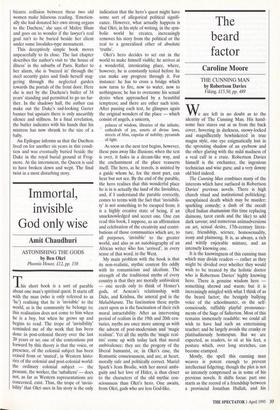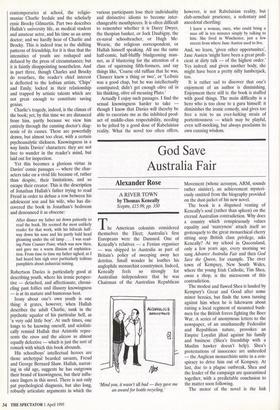The beard factor
Caroline Moore
THE CUNNING MAN by Robertson Davies Viking £15.50, pp. 489 We are left in no doubt as to the identity of The Cunning Man. His hand- some face stares out at us from the back cover, hovering in darkness, snowy-locked and magnificently bewhiskered in true magus style, one eye enigmatically lost in the sprouting shadow of an eyebrow and the other glaring with the mild madness of a veal calf in a crate. Robertson Davies himself is the enchanter, the ingenious technician and wise guru; and a very downy old bird indeed.
The Cunning Man combines many of the interests which have surfaced in Robertson Davies' previous novels. There is high church ritual and institutional politicking; unexplained death which may be murder; sparkling comedy; a dash of the occult (Red Indian shamanism this time replacing daimons, tarot cards and the like) to add dark savour; and numerous animadversions on art, sexual desire, 17th-century litera- ture, friendship, science, homosexuality, irony and plainsong. It is, as always, a rich and wittily enjoyable mixture, and an intensely knowing one.
It is the knowingness of this cunning man which may divide readers — rather as they might be divided over whether they would wish to be treated by the holistic doctor who is Robertson Davies' highly knowing hero. There is genuine wisdom here something shrewd and warm; but it is increasingly mingled with what I think of as the beard factor; the benignly bullying voice of the schoolmaster, or the self- consciously, raffishly playful pronounce- ments of the Sage of Salterton. Most of this remains imMensely readable: we could all wish to have had such an entertaining teacher; and he largely avoids the cranky or platitudinously homespun. But we are expected, as readers, to sit at his feet, a posture which, over long stretches, can become cramped.
Mostly, the spell this cunning man weaves is potent enough to prevent intellectual fidgeting; though the plot is not so intensely compressed as in some of his previous novels. It shifts focus: part one starts as the record of a friendship between a provincial Jonathan Hullah, and his contemporaries at school, the religio- maniac Charlie Iredale and the scholarly cynic Brock), Gilmartin. Part two describes Hullah's university life, as medical student and amateur actor, and his time as an army doctor; and we hardly hear of Charlie and Brocky. This is indeed true to the shifting patterns of friendship, for it is thus that the intensities of youth are reshaped and defused by the press of circumstances; but it is faintly disappointing nonetheless. And in part three, though Charles and Brocky do resurface, the reader's chief interest is deflected to the lesbian artists, 'Chips' and Emily, locked in their relationship and trapped by artistic talents which are not great enough to constitute saving genius.
Charlie's tragedy, indeed, is the climax of the book; yet, by this time we are distanced from him, partly because we view him entirely through the cunning doctor's diag- nosis of its causes. These are powerfully drawn, but almost too clear, with a certain psychoanalytic slickness. Knowingness in a way limits Davies' characters: they are not free to wander in the reader's mind, but laid out for inspection.
Yet this becomes a glorious virtue in Davies' comic passages — where the char- acters take on a vivid life because of, rather than despite, their limitations, and so escape their creator. This is the description of Jonathan Hullah's father trying to read Freud in order to defuse a row between his adolescent son and his wife, who has dis- covered the book in Jonathan's bedroom and denounced it as obscene: After dinner my father sat down patiently to read the book. He seemed the most unlikely reader for that work, with his bifocals half- way down his nose and his partly bald head gleaming under the oil lamp . . . I was read- ing Point Counter Point, which was new then, and gave me a warm illusion of sophistica- tion. From time to time my father sighed, as I had heard him sigh over particularly tedious pamphlets about industrial mining.
Robertson Davies is particularly good at describing youth, where his ironic perspec- tive — detached, and affectionate, chroni- cling past follies and illusory knowingness — is at its mature and humorous best.
Irony about one's own youth is one thing: it grates, however, when Hullah describes the adult Charlie, sunk in the psychotic squalor of his particular hell, as `a very odd little boy'. At such times, one longs to be knowing oneself, and sciolisti- cally remind Hullah that Aristotle repre- sents the eiron and the alazon as almost equally defective — which is just the sort of remark with which this book abounds.
His schoolboys' intellectual heroes are those archetypal bearded savants, Freud and George Bernard Shaw. Hullah, narrat- ing in old age, suggests he has outgrown their brand of knowingness, but their influ- ence lingers in this novel. There is not only pat psychological diagnosis, but also long, robustly articulate arguments in which the various participants lose their individuality and distinctive idioms to become inter- changeable mouthpieces. It is often difficult to remember whether it is Darcy Dwyer, the thespian banker, or Jock Daubigny, the ex-naval schoolteacher, or Hugh Mc- Wearie, the religious correspondent, or Hullah himself speaking. All use the same half-comic, half-bluffly bludgeoning man- ner, as if blustering for the attention of a class of squirming fifth-formers, and say things like, 'Coarse old ruffian that he was, Chaucer knew a thing or two', or `Leibniz was a good chap, but he was intellectually constipated; didn't get enough olive oil in his thinking, olive oil meaning Plato.'
Actually I enjoy such passages. I find the sexual knowingness harder to take though I know that Davies will thereby be able to excoriate me as the inhibited prod- uct of middle-class respectability, needing to be jolted by a good dose of Rabelaisian reality. What the novel too often offers, however, is not Rabelaisian reality, but club-armchair prurience, a sedentary and anecdotal chortling: I knew a woman, once, who could bring a man off in ten minutes simply by talking to him. She lived in Winchester, just a few streets from where Jane Austen used to live.
And, we learn, 'given other opportunites', Jane Austen 'might have been a great profi- cient at dirty talk — of the highest order.' Yes indeed; and given another body, she might have been a pretty nifty lumberjack, too.
It is rather sad to discover that one's enjoyment of an author is diminishing. Enjoyment there still is: the book is stuffed with good things. The main difficulty is a hero who is too close to a guru himself: it diminishes the ironic comedy, and gives too free a rein to an ever-lurking strain of portentousness — which may be playful, even self-mocking, but always proclaims its own cunning wisdom.



























































 Previous page
Previous page